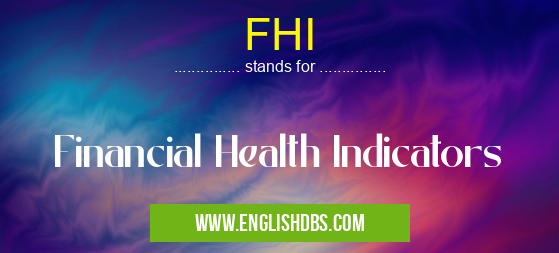What does FHI mean in GENERAL
Financial Health Indicators (FHI) are a set of metrics used to evaluate the financial stability and performance of businesses. FHI are used to measure the risk that a company carries and its ability to withstand unforeseen economic pressures. They also provide insights into the expected performance of a business, as well as identify business opportunities. By using FHI, companies can make better decisions and increase their chances of success.

FHI meaning in General in Business
FHI mostly used in an acronym General in Category Business that means Financial Health Indicators
Shorthand: FHI,
Full Form: Financial Health Indicators
For more information of "Financial Health Indicators", see the section below.
Benefits
By understanding how each metric impacts an organization’s overall financial health, organizations can adjust their strategies accordingly for improved outcomes based on predictions from FHI analysis. Analysis may reveal areas where expenses can be reduced or investments could be made that will increase profitability over a specific timeline; it may even reveal problems in operations or production processes that must be addressed before they become larger issues or lead to costly losses down the line — all helping create an environment where an organization can strive towards greater fiscal responsibility and ultimately achieve more success in its chosen market space.
Essential Questions and Answers on Financial Health Indicators in "BUSINESS»GENERALBUS"
What are Financial Health Indicators?
Financial Health Indicators (FHI) are metrics used to assess the financial condition of an individual or business. They can include net worth, debt-to-income ratio, account balances, available credit, payment history, and more. By looking at these indicators, businesses and individuals can assess their financial health and make decisions accordingly.
How do Financial Health Indicators help me?
Financial Health Indicators (FHI) provide meaningful insight into your current financial situation. By analyzing FHIs like your debt-to-income ratio, cash flow management, and net worth you can gain important insights into how healthy your finances are and where improvements could be made. Ultimately this allows you to make better decisions for your future financial health.
What are some common Financial Health Indicators?
Common Financial Health Indicators (FHI) include net worth, debt-to-income ratio, account balances, available credit utilization rate, payment history, savings rate, investment portfolio diversification level and liquidity. These metrics provide valuable insight into the financial condition of an individual or business, allowing them to make more informed decisions about their finances.
Who should be aware of their Financial Health Indicators?
Everyone who is managing money should be aware of their own and/or their business’s Financial Health Indicators (FHIs). Knowing how different indicators relate to each other provides a powerful tool for gaining insight into your overall financial health. This information can then be used to make better decisions regarding investments or spending habits.
Are there specific tools or applications that can help me understand my Financial Health Indicators?
Yes! There are many applications available that allow users to track and analyze their own FHIs as well as those of their businesses. These tools usually offer personalized insights into personal finance topics such as budgeting and cash flow management as well as providing methods for tracking individual FHIs over time so trends can be identified.
Is understanding my FHIs complicated?
Not necessarily! While there may be some technical terms associated with certain indicators it’s really all about understanding how different numbers relate to each other in order to gain a fuller picture of one’s financial health. The good news is there are many resources out there that make it easier than ever before to learn about finance topics such as these including books, articles online forums etc., providing people with a great starting point for understanding these complex topics.
What action should I take if my FHIs indicate poor overall financial health?
If you identify any areas where your personal or business finances might not be up to par it’s important to take action right away in order to prevent further damage down the line. Start by educating yourself on the particular issue at hand – whether it’s budgeting Cash Flow Management or Debt Consolidation – then research potential solutions that will enable you to get back on track quickly.
How often should I review my FHIs?
It’s recommended that individuals review their own FHIs on a regular basis (at least once a quarter ) in order ensure they remain up-to date on their current financial situation which includes any changes or fluctuations in the market place.. Businesses should review theirs on an even more frequent basis since they may face different challenges than individuals.
How accurately do my FHIs reflect my true financial condition?
This depends on how honest you're being when calculating them as well as external factors which may have an impact – i.e.: fluctuating markets etc.. FHIs based solely off accurate data points will give you a good representation of your current financial condition but it never hurts to double check just for peace of mind.
Final Words:
Financial Health Indicators are invaluable tools for businesses in understanding their current fiscal position and predicting changes in market conditions. Utilizing FHI assessments allows them to make necessary adjustments early on rather than reacting to changes later when potential risks have already been incurred; making these analyses essential for all businesses wishing to remain competitive and profitable today and into the future.
